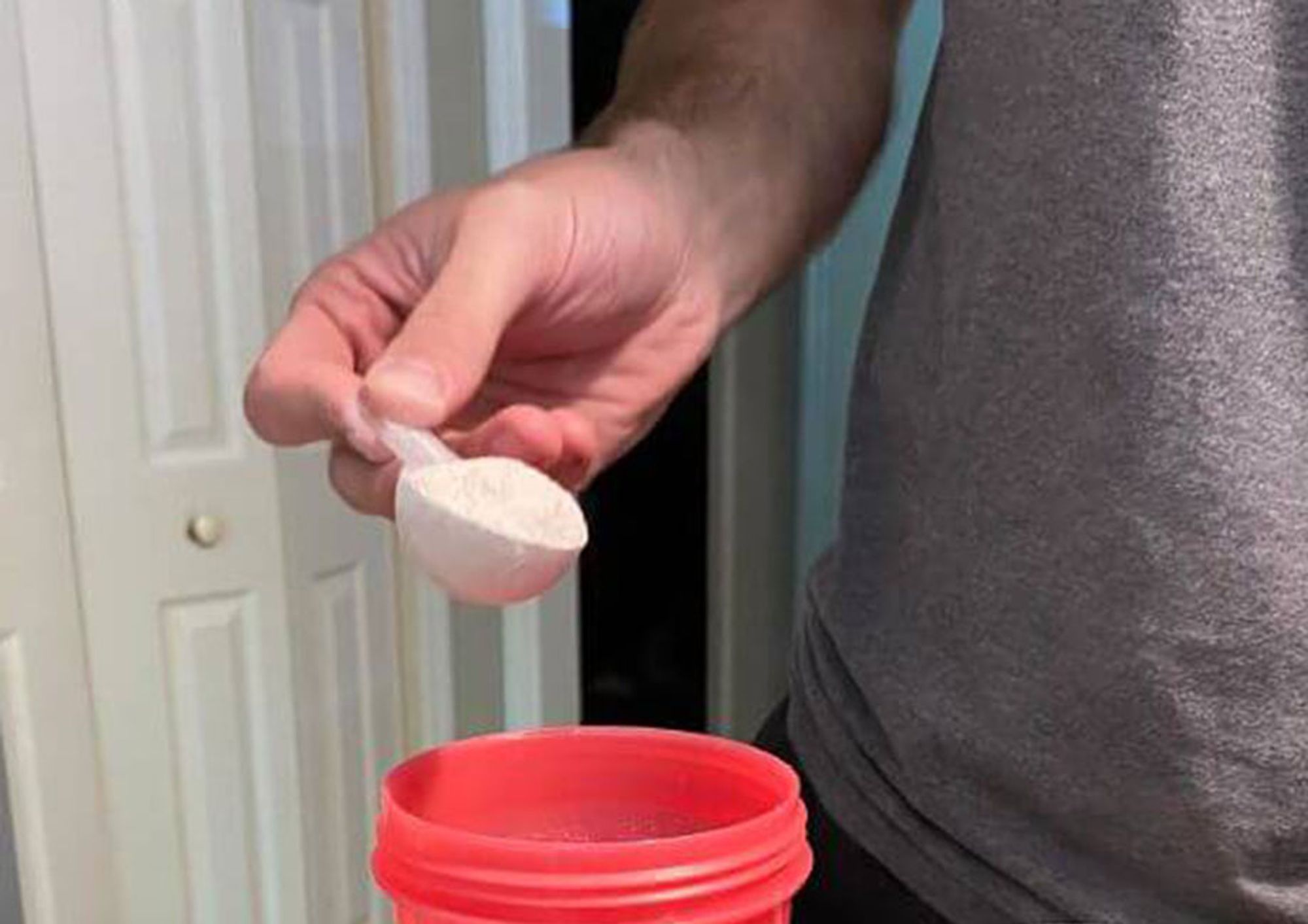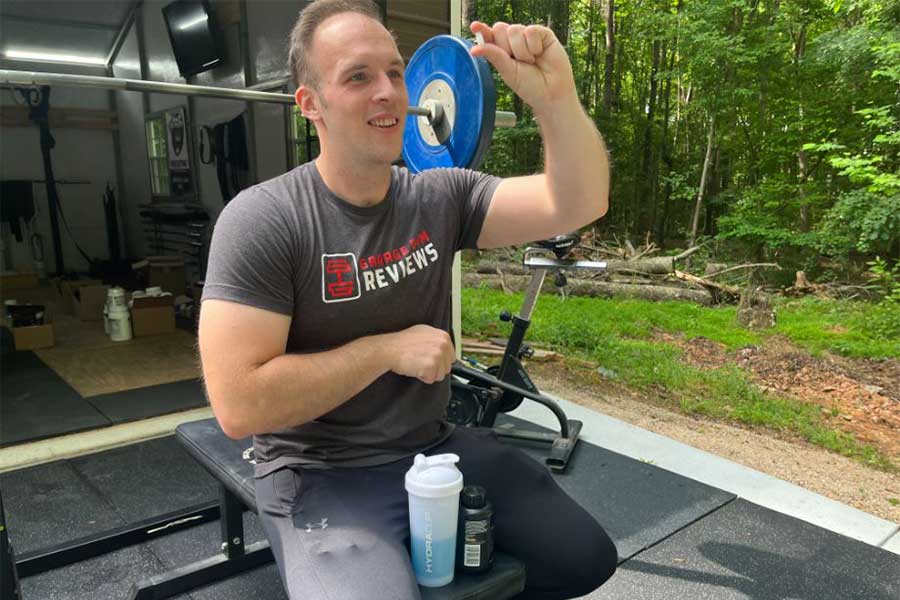As a certified personal trainer and longtime rugby player, I’m always looking for ways to enhance my workout performance to make the most muscle gains. While consuming some fast-digesting carbs and completing a thorough warm-up certainly help, there’s nothing wrong with relying on supplements for support, too. From both my experience and the decades of scientific research, it’s clear that creatine can be an effective tool for unlocking your muscle- and strength-building potential.
RELATED: Best Creatine Supplements
However, beginners and even some more experienced gym-goers are often confused about how to use creatine and what it does. The good news is that not only is creatine not nearly as complicated as it may seem, but it can serve as one-half of a pairing that’ll take your training sessions to the next level. For those who’ve been wondering, “Can I mix creatine with pre-workout?” the short answer is yes, you can take creatine and pre-workout together to set yourself up for a successful strength training session. In fact, some of the best pre-workout supplements contain creatine as part of the formulation. I’ve broken down everything you need to know about both supplements so you can finally put that question to rest and start reaping the rewards of this dynamic duo.
Medical disclaimer: This article is intended for educational and informational purposes only. It is not intended as a substitute for medical advice. For health advice, contact a licensed healthcare provider.
What Is Creatine?
Creatine is a naturally occurring compound primarily synthesized in the liver, kidneys, and pancreas from the amino acids glycine, arginine, and methionine. It plays a pivotal role in the production of adenosine triphosphate (ATP)1, the primary source of energy for your cells. Available in red meat and seafood, creatine has been one of the most popular supplements in the bodybuilding and athletic communities for decades due to its impact on muscle growth and power production.
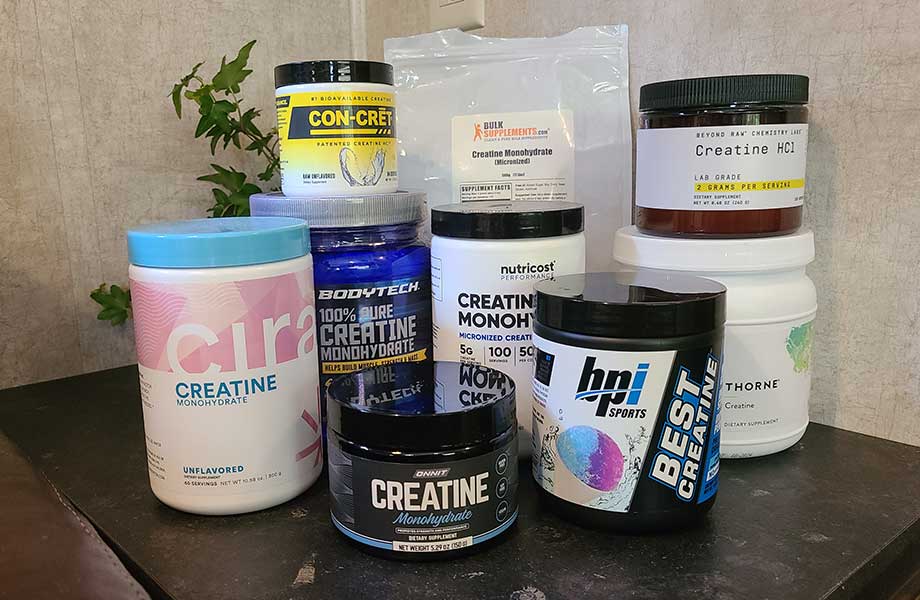
RELATED: What Is Creatine?
When ingested, creatine is rapidly absorbed into the bloodstream and stored in your muscles as phosphocreatine. During high-intensity exercises like sprinting, jumping, or resistance training, phosphocreatine helps increase and replenish ATP stores, which allows for sustained energy production2.
Creatine supplementation has been extensively studied3 and shown to have various benefits for athletes and fitness enthusiasts. One of its primary effects is an increase in muscle mass and strength. By promoting water retention within muscle cells and stimulating protein synthesis, creatine supplementation leads to greater muscle volume and improved force production4.
Moreover, creatine has been found to improve athletic performance across a range of sports and activities. Research indicates it can increase power output, speed, and endurance, allowing athletes to train harder and longer4. That means you may be able to squeeze out a few more reps on the bench press or power through leg day just a little bit easier. Additionally, creatine supplementation may aid in recovery by reducing muscle damage and inflammation post-exercise, leading to faster recovery between workouts.
How to Take Creatine
I’ve used creatine dating back to my rugby playing days at the University of Florida, where I felt it helped me be more explosive in the gym and on the field. Like most lifters and athletes, I used it in the form of creatine monohydrate—a relatively inexpensive supplement that’s essentially a tasteless but powerful powder. Luckily, it mixes easily with water, juice, or your pre-workout drink and won’t affect the flavor.
The protocol for how to take creatine often involves two phases, each of which includes different dosages.
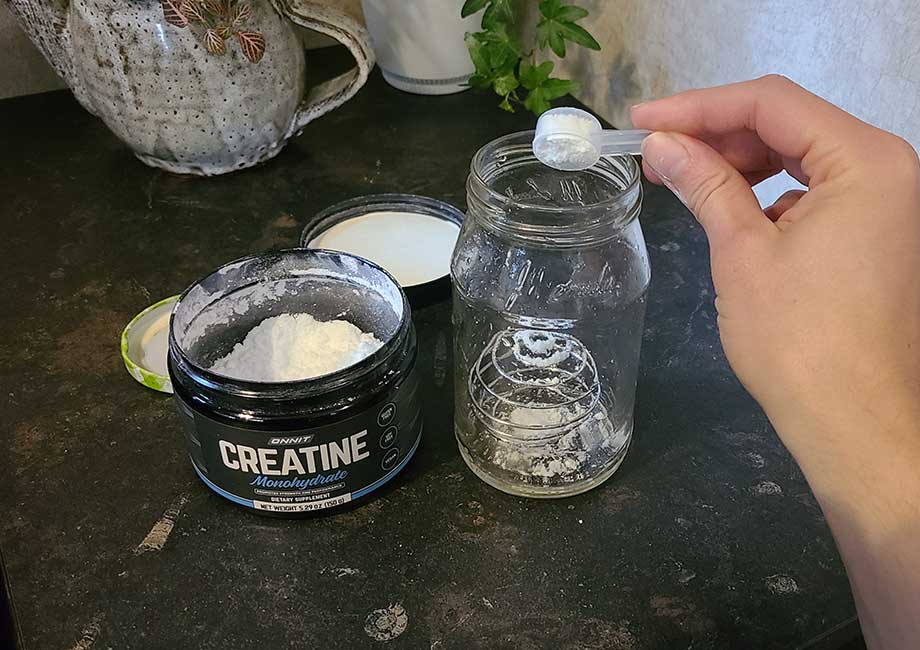
Loading Phase
While not necessary, many people choose to follow a short-term creatine loading phase to quickly saturate the skeletal muscle cells with creatine. According to the International Society of Sports Nutrition’s dosing guidelines, this involves taking 5 grams of creatine four times a day for a total daily dose of 20 grams3.
After five to seven days of this protocol, you will then move into a maintenance phase.
Maintenance Phase
Once you’ve spent a week loading your creatine stores, you will cut back significantly on the amount you consume. Research shows that a maintenance dose of 3 to 5 grams per day is sufficient for maintaining optimal creatine levels3.
However, larger athletes may need more—potentially up to 10 grams per day—to support their higher lean body mass. As someone who weighs around 225 pounds, I’ve stuck to 5 grams a day for years and have been satisfied with my results.
If you don’t mind it taking a little longer to see results and prefer not to do a loading phase, you can begin by taking the maintenance dose of 3 to 5 grams per day.
What Is Pre-Workout?
Pre-workout supplements are designed to enhance exercise performance, energy levels, focus, and endurance. They typically come in powdered form and are mixed with water or other beverages for consumption. There are also ready-to-drink (RTD) options that are convenient when you’re on the go or don’t have time to mix your own.
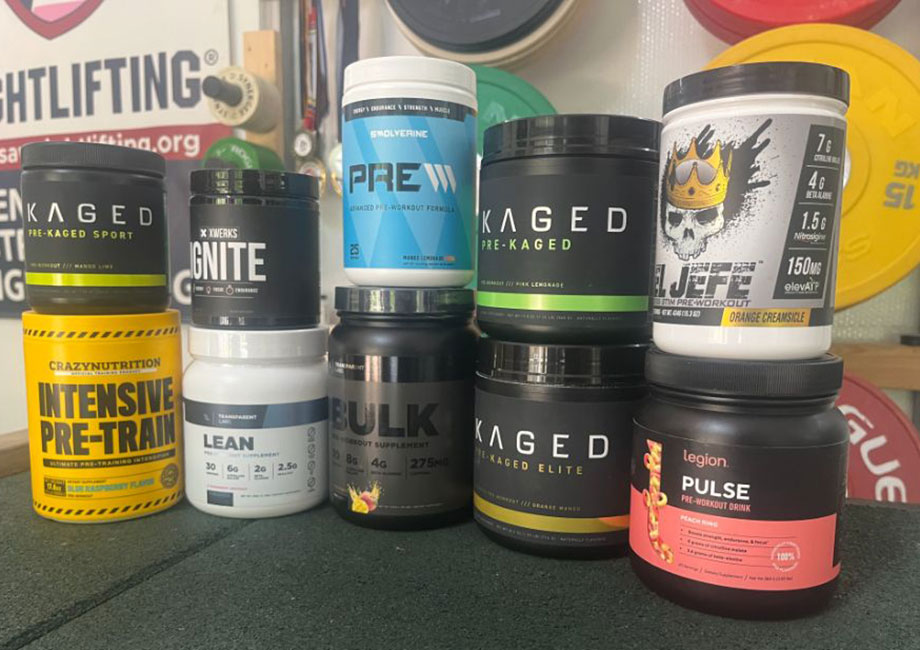
From a formulation perspective, pre-workout ingredients vary by brand. However, research shows that some common ingredients5 include:
- Beta-alanine: Helps buffer lactic acid buildup, improve perceived exertion, and delay muscle fatigue6
- Caffeine: Increases alertness and improves endurance7
- Citrulline: A nitric oxide booster that increases blood flow and enhances muscle pumps8
- Tyrosine: An amino acid that enhances cognitive performance and focus9
- Taurine: An amino acid that can help with muscle fatigue and increase enzymatic antioxidants10
- Creatine: Helps replenish ATP stores during high-intensity exercise2
RELATED: Best Pre-Workout With Creatine
Many athletes and weightlifting enthusiasts rely on pre-workouts to help them overcome fatigue, maintain intensity throughout their workouts, and break through performance plateaus. Additionally, pre-workouts are often used by individuals who train early in the morning or after a long day at work to boost energy levels and overall focus.
How to Take Pre-Workout
Pre-workout supplements are typically taken 30 to 45 minutes before exercising so your body can absorb and process the ingredients. It’s essential to follow the dosage instructions on the product label to avoid any adverse effects.
Start by mixing the recommended amount of pre-workout powder with water or another beverage. While some people prefer to take pre-workout on an empty stomach for faster absorption, others may prefer to have a snack or small meal beforehand to avoid stomach discomfort.
Remember that individual tolerances to ingredients like caffeine and beta-alanine vary, so you may want to start with a lower dosage to assess your body’s reaction and gradually increase as needed. Additionally, it’s wise to cycle off pre-workout occasionally to prevent tolerance buildup and to give your body a break from stimulants.
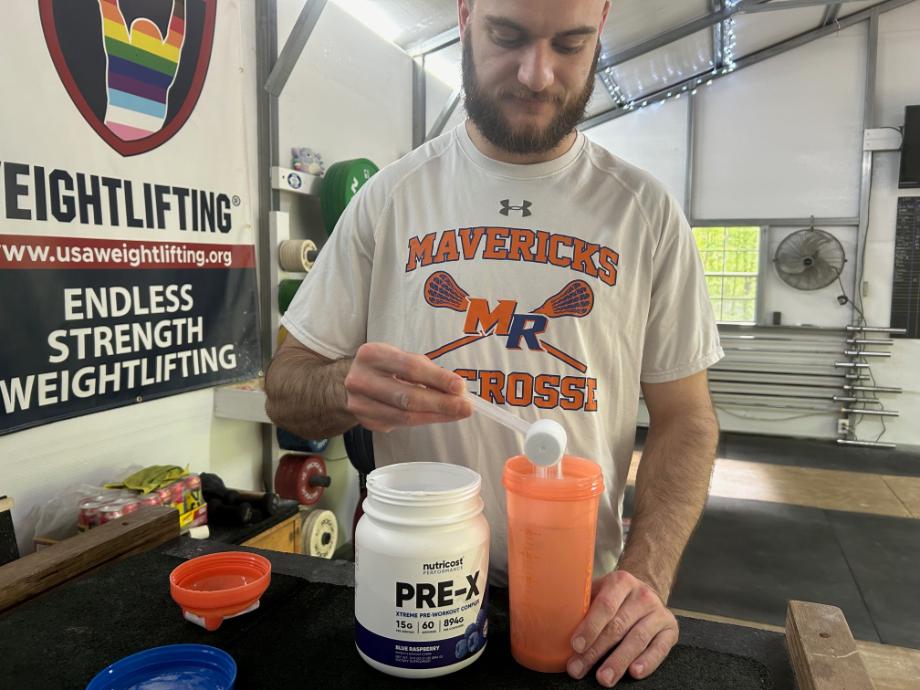
Creatine and Pre-Workout: Benefits
Combining creatine with a pre-workout supplement can offer synergistic benefits. Since the benefits of creatine include enhanced strength, muscle mass, and power, adding a pre-workout to the mix can give you the energy and focus boost needed to get the most out of your training.
A 2010 study11 on the effects of a pre-workout supplement containing creatine, caffeine, and amino acids found that the test subjects (24 moderately-trained recreational athletes) demonstrated improvements in VO2max and lean body mass. Evidence suggests that aerobic and anaerobic performance can be positively impacted with supplementation.
Creatine and Pre-Workout: Potential Side Effects
While both creatine and pre-workout supplements are generally safe when used as directed, they can have side effects.
When it comes to creatine, some individuals may experience gastrointestinal discomfort, especially during the loading phase. It can also lead to water retention, although this is often intracellular and can contribute to muscle fullness. Despite misconceptions that creatine can cause cramping, a 2021 review12 published in the Journal of the International Society of Sports Nutrition confirmed that isn’t true.
With pre-workout supplements, particularly those containing stimulants, some people may experience side effects such as jitters, increased heart rate, and skin reactions13. In addition, since caffeine is a diuretic, you may run into hydration issues. This makes it particularly important to drink water during and after your workout to account for dehydration.
RELATED: Pre-Workout Side Effects
Can I Mix Creatine With Pre-Workout? Final Thoughts
The creatine-pre-workout combo can be a game-changer for lifters of all experience levels. From better muscle pumps and blood flow to enhanced strength and power, you can reap valuable benefits by taking these two supplements together.
A few key points to keep in mind:
- A loading phase of five to seven days will allow you to build up maximum creatine concentrations in your muscles before you dial back the dosage for a maintenance phase.
- Since some pre-workouts already contain creatine, ensure you don’t go overboard by checking the nutrition label first.
- Combining the two supplements can give you the best of both worlds in terms of workout performance and muscle recovery.
Can I Mix Creatine With Pre-Workout? FAQs
When should I take pre-workout and creatine?
You should consume your pre-workout supplement about 30 to 45 minutes before you start training. You can take your creatine at the same time or post-workout, as research shows both methods are effective.
Can I take creatine if my pre-workout already has it?
Yes, but monitor the total dosage to avoid exceeding recommended levels. Although some pre-workouts contain creatine many don’t contain the full recommended dose of 3 to 5 grams, so you may still want to supplement to reach the optimal amount of creatine per day.
Is it OK to mix creatine with anything?
Creatine can be mixed with various liquids like water, juice, or pre-workout drinks. However, avoid mixing it with acidic beverages, as they may degrade creatine over time.
These statements have not been evaluated by the Food and Drug Administration. This product is not intended to diagnose, treat, cure, or prevent any diseases.
References
- Dunn J, Grider MH. Physiology, Adenosine Triphosphate. [Updated 2023 Feb 13]. In: StatPearls [Internet]. Treasure Island (FL): StatPearls Publishing; 2024 Jan-. Available from: https://www.ncbi.nlm.nih.gov/books/NBK553175/
- Guimarães-Ferreira L. Role of the phosphocreatine system on energetic homeostasis in skeletal and cardiac muscles. Einstein (Sao Paulo). 2014 Jan-Mar;12(1):126-31. doi: 10.1590/s1679-45082014rb2741. PMID: 24728259; PMCID: PMC4898252.
- Kreider RB, Kalman DS, Antonio J, Ziegenfuss TN, Wildman R, Collins R, Candow DG, Kleiner SM, Almada AL, Lopez HL. International Society of Sports Nutrition position stand: safety and efficacy of creatine supplementation in exercise, sport, and medicine. J Int Soc Sports Nutr. 2017 Jun 13;14:18. doi: 10.1186/s12970-017-0173-z. PMID: 28615996; PMCID: PMC5469049.
- Wax B, Kerksick CM, Jagim AR, Mayo JJ, Lyons BC, Kreider RB. Creatine for Exercise and Sports Performance, with Recovery Considerations for Healthy Populations. Nutrients. 2021 Jun 2;13(6):1915. doi: 10.3390/nu13061915. PMID: 34199588; PMCID: PMC8228369.
- Jagim AR, Harty PS, Camic CL. Common Ingredient Profiles of Multi-Ingredient Pre-Workout Supplements. Nutrients. 2019 Jan 24;11(2):254. doi: 10.3390/nu11020254. PMID: 30678328; PMCID: PMC6413194.
- Berti Zanella P, Donner Alves F, Guerini de Souza C. Effects of beta-alanine supplementation on performance and muscle fatigue in athletes and non-athletes of different sports: a systematic review. J Sports Med Phys Fitness. 2017 Sep;57(9):1132-1141. doi: 10.23736/S0022-4707.16.06582-8. Epub 2016 Jul 5. PMID: 27377257.
- Martins GL, Guilherme JPLF, Ferreira LHB, de Souza-Junior TP, Lancha AH Jr. Caffeine and Exercise Performance: Possible Directions for Definitive Findings. Front Sports Act Living. 2020 Dec 11;2:574854. doi: 10.3389/fspor.2020.574854. PMID: 33345139; PMCID: PMC7739593.
- Gonzalez AM, Yang Y, Mangine GT, Pinzone AG, Ghigiarelli JJ, Sell KM. Acute Effect of L-Citrulline Supplementation on Resistance Exercise Performance and Muscle Oxygenation in Recreationally Resistance Trained Men and Women. J Funct Morphol Kinesiol. 2023 Jun 22;8(3):88. doi: 10.3390/jfmk8030088. PMID: 37489301; PMCID: PMC10366749.
- Jongkees BJ, Hommel B, Kühn S, Colzato LS. Effect of tyrosine supplementation on clinical and healthy populations under stress or cognitive demands–A review. J Psychiatr Res. 2015 Nov;70:50-7. doi: 10.1016/j.jpsychires.2015.08.014. Epub 2015 Aug 25. PMID: 26424423.
- Chen Q, Li Z, Pinho RA, Gupta RC, Ugbolue UC, Thirupathi A, Gu Y. The Dose Response of Taurine on Aerobic and Strength Exercises: A Systematic Review. Front Physiol. 2021 Aug 18;12:700352. doi: 10.3389/fphys.2021.700352. PMID: 34497536; PMCID: PMC8419774.
- Smith, A.E., Fukuda, D.H., Kendall, K.L. et al. The effects of a pre-workout supplement containing caffeine, creatine, and amino acids during three weeks of high-intensity exercise on aerobic and anaerobic performance. J Int Soc Sports Nutr 7, 10 (2010). https://doi.org/10.1186/1550-2783-7-10
- Antonio J, Candow DG, Forbes SC, Gualano B, Jagim AR, Kreider RB, Rawson ES, Smith-Ryan AE, VanDusseldorp TA, Willoughby DS, Ziegenfuss TN. Common questions and misconceptions about creatine supplementation: what does the scientific evidence really show? J Int Soc Sports Nutr. 2021 Feb 8;18(1):13. doi: 10.1186/s12970-021-00412-w. PMID: 33557850; PMCID: PMC7871530.
- Jagim AR, Camic CL, Harty PS. Common Habits, Adverse Events, and Opinions Regarding Pre-Workout Supplement Use Among Regular Consumers. Nutrients. 2019 Apr 16;11(4):855. doi: 10.3390/nu11040855. PMID: 31014016; PMCID: PMC6520716.


